Poland is Ukraine’s best friend in Europe. But no alliance can ever be entirely unconditional, and this is as true of the Poland–Ukraine bond as of any other. Poland, which has supplied Ukraine with tanks and fighter jets since the start of the war with Russia, has now said it will stop supplying weapons. The reason for the fall out is one that has been simmering for months: Ukraine’s grain.
Since Russia withdrew its Turkish-negotiated free pass for grain exported from Ukraine ports in July, Moscow has been targeting Ukraine’s grain infrastructure at Odesa and elsewhere. As a result, while some neutral vessels are still carrying export cargoes (a laden Turkish-owned ship left Ukrainian port Chornomorsk a couple of days ago for Israel, and more voyages are planned), ship owners and insurers are still jittery, and much wheat needs to find other ways out.
The obvious alternative destination is Poland, if only because getting bulk cargoes into the rest of Europe is expensive. (Among other things, the Ukrainian railway gauge is different from the European one, necessitating trans-shipment). But Poland has a large grain-producing sector of its own.
Warsaw’s Law and Justice government faces a possibly tight election next month and cannot afford to risk its large agricultural vote by allowing in huge quantities of Ukrainian wheat which would undercut the home-grown variety. Until last week, this did not matter much. Poland had the benefit, together with several other eastern EU countries, of a temporary arrangement under which Ukrainian grain could travel through it to the rest of the EU or be shipped at Gdynia, but could not be sold there.
But that ended last week, and Brussels, which under EU law has control of trade policy, declined to renew it. Faced with the choice between bankrupting its own farmers and defying Brussels, Warsaw has chosen the latter: together with two other members of the Visegrad squad, Hungary and Slovakia, it has unilaterally continued the prohibition.
At first sight, Warsaw is backed into an awkward corner. Its exclusion of Ukrainian farm produce is in blatant breach of EU law; it thus faces the wrath of Brussels, Paris and Berlin to the west, and a possible suit in the European Court, which it would almost certainly lose. Meanwhile, it is looking at attack from the east too: Ukraine’s president Volodymyr Zelensky has already charged it before the UN General Assembly with playing into Russia’s hands, and Kyiv has said it will report Poland to the WTO for what is deems an illegal protectionist measure.
Wait a moment, though. Brussels and Kyiv may theoretically be in the right. But in the short to medium term, which is what matters, there is not very much either can do.
Kyiv, to put it bluntly, needs Warsaw more than Warsaw needs Kyiv. Poland is not only the obvious route for, and for that matter one of the biggest suppliers of, war matériel; it is also, together with the Baltic states, a vital supporter of Ukrainian interests against a sometimes less-than-enthusiastic Western Europe. Indeed, it remains staunchly pro-Ukrainian on everything other than grain: it is, for example, still in favor of getting Ukraine into the EU as fast as possible, and in the last week has pressed hard for extension of EU sanctions to cover Russian natural gas and diamonds, commodities still being bought in large amounts by Europe to the fairly direct benefit of the Russian armies in Donetsk.
It may be painful for Zelenskiy to hear a Polish minister say, as one did a couple of days ago, “No one in the world has provided more generous help to Ukrainians than Poles. President Zelensky should remember this. But the government in Warsaw is primarily concerned with taking care of Polish citizens, including farmers.”
In practice, however, he must see this as understandable from an elected minister about to face his voters — and grin and bear it.
The EU is not in a much better situation when it comes to pressuring Poland. When it agreed last April to Poland and others temporarily banning Ukrainian imports of wheat, it was hardly acting voluntarily: it knew perfectly well that, had it not done so, there would have been unilateral action anyway. It is now, it seems, in an even worse position. At least in April it was able to save some face by ostensibly agreeing to a temporary embargo, albeit one slightly doubtful in terms of European law. On this occasion it has, for reasons not very clear, chosen to call Warsaw’s bluff. Its authority, and its bargaining power, will hardly be enhanced now that it faces open defiance from three eastern European member states, two of which have a history of bloody-mindedness and have shown themselves perfectly prepared, when threatened with proceedings in the European Court, to say, calmly, “Bring it on.”
Actually much of the saber-rattling may be for show. Brussels, if it has sense, may well agree to some sort of truce on Ukrainian grain, reviving at least in part the arrangements that applied until last week. And Zelensky, who is nobody’s fool, knows perfectly well which side his bread is buttered. There is little doubt that the Law and Justice Party is his best bet for Poland, and that even for old friendship’s sake he can hardly expect it to throw its farmers to the wolves. In a month or two, it would not be surprising if things on the Kyiv–Warsaw-Brussels front return to normal. We must certainly hope so.
This article was originally published on The Spectator’s UK website.

























